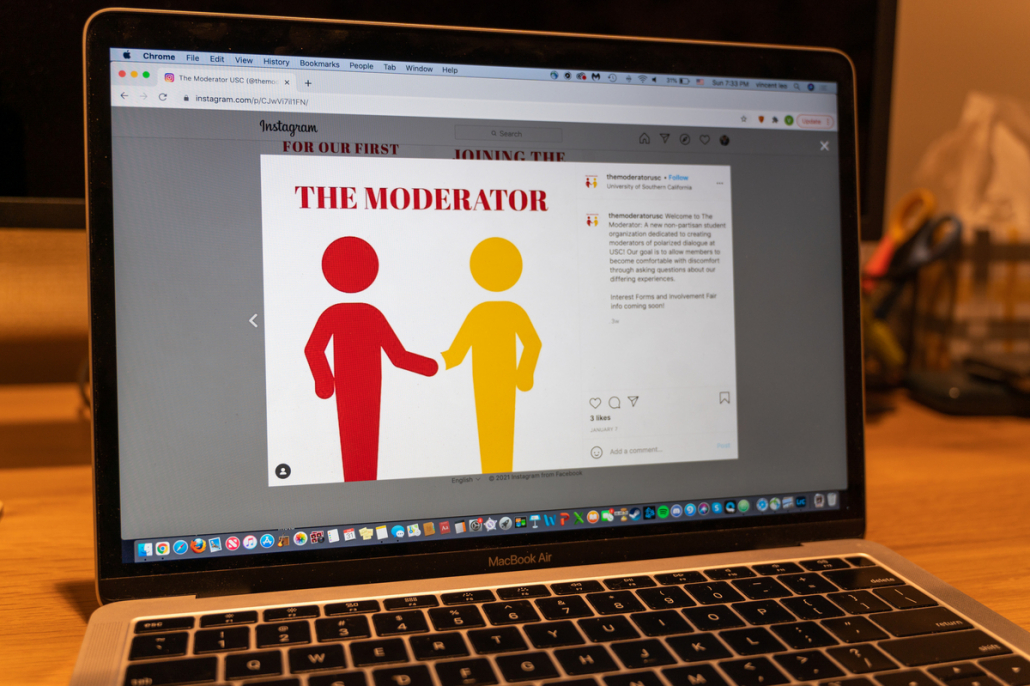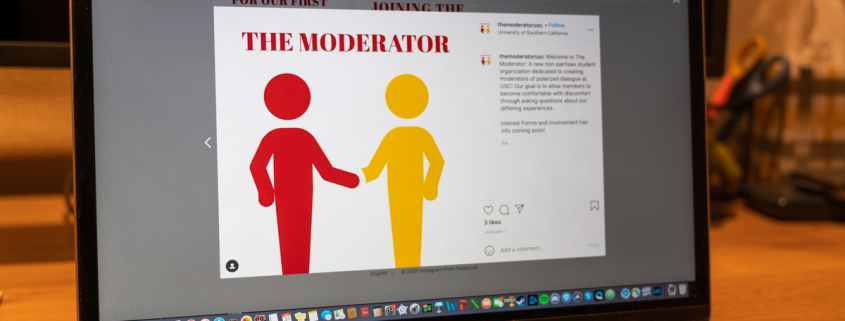New club moderates “uncomfortable” conversations

During the 2020 presidential election, Jillian Kravitz noticed the nation’s political polarization and a toxic environment created from a lack of understanding for others’ beliefs. This led to her, along with co-founder and vice president Alethea Freidberg, establishing The Moderator: a new campus organization for students to have an outlet for their opinions.
“Since when has a presidential election for one person made us completely cut off friends, completely cut off connections, completely divided us [to] such an extreme,?” said Kravitz, a sophomore majoring in global health.
The organization was named “The Moderator” because each discussion is moderated by a member, using a three-tier system for meetings. The first tier is to discuss “icebreaker” topics, such as if one should take hot showers or cold showers, or if one prefers cats or dogs. The second tier are community-based discussion questions, such as “Would raising tuition be good for students?” The third tier involves publicly-deemed controversial topics, such as issues like affirmative action or defunding the police.
Created early-November, the founders said their primary objective is to provide a space for meaningful and productive discussions so students can understand various perspectives.
“I know we don’t like talking to people we disagree with, but nevertheless, it’s important to remember that there’s a rationale from all different perspectives and all opinions,” Kravitz said.
Lexi Lee, one of the first members in the club, emphasized that all points of view and beliefs are respected, even if it leads to uncomfortable conversations. However, Kravitz said that they teach students to “read, reflect, and inspect,” so members can be more aware of their words.
“We’re also trying to make sure that we avoid topics that would allow for harmful rhetoric … So that way, we make sure that wording isn’t loaded, to make sure that [the E-board is] controlling the conversation, but also allowing for it to be productive,” Kravitz said.
The club’s meetings and discussions are monitored and led by the E-board who, although seen as leaders of the organization, are not meant to be seen in elevated positions from other students during discussions, Kravitz said. The club is a constantly evolving entity that allows anyone to make suggestions for changes, she said.
Rather than debating about certain topics, The Moderator focuses on providing awareness on having different opinions.
“The main goal … is to be comfortable with discomfort, the discomfort of disagreeing with people, the discomfort of not having everybody believing the same things you do,” Kravitz said. “The discomfort that our society is at a crossroads,” Kravitz said. “And we can’t just keep sitting in the same echo chambers we have been just because we feel safer in our opinions.”
Freidberg said that in a nation where “everyone politically stays in their own bubble,” having a club that shows many different points of view is essential.
Lee said “there’s something for everyone,” as not all discussions are always political. One of the topics discussed at an unofficial “test run” meeting, she said, was on toilet paper orientation — whether toilet paper should be placed upwards or downwards on the roll.
“Obviously, that’s not a super controversial topic … but it was cool to see how I can just come to an understanding from such a simplistic topic,” said Lee, a sophomore majoring in communication.
Seeing how other people viewed putting toilet paper downwards made her realize there is always a different perspective, even with topics that “affect our everyday lives in such nuanced ways.”
The first official meeting, held Jan. 27, contained civil discussion about about whether hotdogs could be considered sandwiches, whether canceling spring break was justified and whether a nation-wide lockdown would be beneficial at that point in time, Freidberg said.
For each topic discussed, the 15 participants would change their Zoom name to their stance on the issue, then elaborate in conversation. Kravitz said participants were engaged, asking each other questions to further each discussion.
“I’m so glad it went so well … Everyone that has been involved in the founding of this club has been working so hard,” Freidberg said. “It was just a simple idea back in November and to see it finally become a reality, … it feels nice that it pays off.”
Kravitz said the club will “slowly, but surely, better encompass what makes up the University of Southern California,” as new members join and bring in their own perspectives on difficult issues and confront societal controversies.
In the future, Kravitz and Freidberg hope to bring in guest speakers, panelists and anybody with a unique perspective or background. They also hope to participate in fundraisers, town halls and collaborate with other student organizations on campus, they said.
Freidberg also said she sees the club becoming a national organization, reaching other campuses and possibly holding national meetings every semester.
“When this becomes a multinational, multi-campus thing, we definitely want to have events once a semester with students from other schools to have our own little meetings, because I feel like discussion with college-aged students from other schools will be so interesting to have. That would also prepare us for a larger scale national event,” Freidberg said.
After the coronavirus pandemic subsides and the club can meet in-person, Kravitz plans on creating pop-up booths across campus that allow students to give their opinions on certain topics provided by the booth so that any USC student can participate in open discussions. She also predicts that meetings will be similar to Socratic seminars with desks arranged in a circle.
The Moderator’s Zoom meetings are held on Wednesdays at 5 p.m. Those interested in joining can reach out to themoderatorusc on instagram or email [email protected].
Correction: A previous version of this article misspelled Alethea Freidberg’s name as “Friedberg.” The Daily Trojan regrets this error.

